As the buck moon wanes, Little A, filled with emotion and mortification, stumbled for words to express the absence of empathy in humanity. Squatting in moonlight, streams of tears flushed his sticky cheeks. He had witnessed the cold killing of his extraordinarily large tadpole, at first mistaken as a fish, ripped apart by deft and nimble fingers as little as his. He was vehement to renounce friendship with the ripper – Wild P. Little A poked around the murky water with traces of algae, a water skater, 3 dragonfly nymphs and another brown tadpole in its final stages of metamorphosis. The pool was not the same without the extraordinary tadpole mistaken as fish.
Wild P, a spirited wild child of the village, hangs precariously from the reinforcement steels poking out from a third of a concrete column. He swings freely from it in bemusement whilst keeping a distance from fuming Little A. He could catch handfuls of tadpoles faster than Little A could attach a little of himself to the creatures. It did not occur to him that his action could pan out this way. When they play, laughter trembles through the air and violates silence. When they fight, rage oozes from every pore of Little A. In such a scenario, Wild P, in delirium, would take flight leaving a trail of misfits into the wet landscape where he naturally becomes one with it. As slippery as an eel, Little A cannot catch him. Their chemistry often proves explosive. But the other quiet one, a P, brings a kind of equilibrium to their threesome play. Quiet P, a tad older, prefers the calmer waters. He observes the pandemonium when it breaks out and takes no sides. He diverts his attention to the spiders and the few non-organic playthings manufactured in the urban.
Big A reaches a pinnacle of annoyance when Wild P climbs along the vertical drainage pipes and pops his head into the window to see what he is up to. Big A wails in vexation and tells off the wild one at the top of his voice. He bosses the threesome and tries to get them further away from the radius of his being, his hormones knocking at the front door of early teenhood, pelting at one another and concocting moodiness in immeasurable proportions. Mama I is feeling a little lost wading in his brooding.
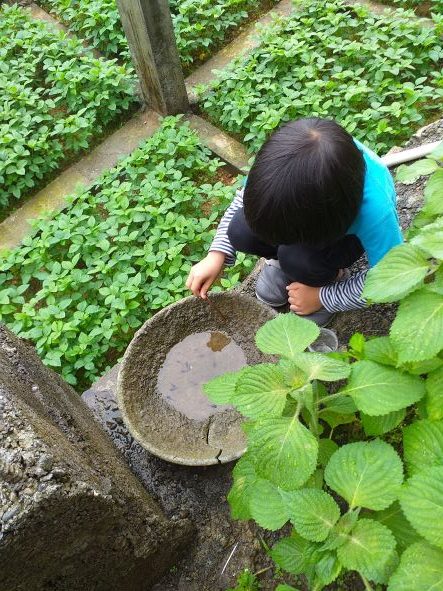
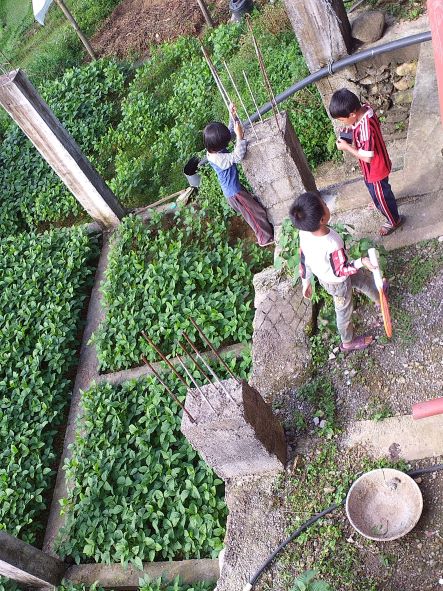
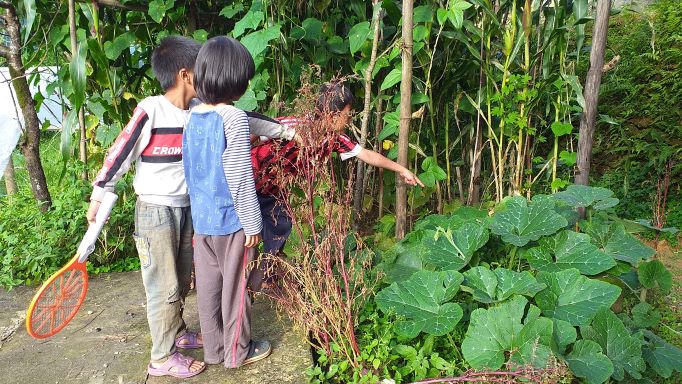
Rain ceased. A radiant light beam from the west cracks through the grey clouds when Another P and Another A call out for a game of football. Big A, projecting a livelier tone almost instantaneously, his lethargy vapourised, shouts out, “Coming!” He takes a mental note of the page number, pushes the book aside and grunts his way out of bed. His unruly hair and grumps exit from sight and sound. Mama A is relieved from the weight of the grey kingdom, gratified for some calm and quiet to read. But she knows it is not long enough; it never is. A long list of pdf books await to be devoured somehow, most of which were written, translated and encapsulated by the enigmatic souls of the living dead, stored on the invisible shelves of an electronic hard drive. Her pill of ecstasy.
Quiet P spots a giant slug inching its way to a stack of bamboo, at a speed of a fraction of a second slurring into a laid-back tick-tock. Little A and Wild P decided to be friends again when the eruption subsided. As a trio, they watched the unhurried slime creature contracting its tiny muscles in its ‘foot’ in sequence, generating a wave that moves from front to back. As the wave moves back, different parts of the foot take in turns to grip the ground and pull the animal forward. They wondered if its locomotion is reversible. Wild P has a tendency to dislocate moving things and Little A is zealous he does none of it. To their delight they find a family of rather large slugs huddled around the stacks of bamboo, practising social distancing whilst a little one curled up in the darkness of the hollow.



Since the big move, Big A and Little A have concluded that babies and younglings in almost all animals are destined to melt hearts, but with resounding and unanimous agreement to the exception of baby flies, or more accurately fly larvae. Who could possibly share tenderness in maggots leaching out from a ripe banana or a swarm of them catapulting themselves out from vegetable peels in the kitchen bin. Their state of immaturity somehow projects revulsion greater than their adult form. As Mama I writes, there are plenty of occasions when a fly would perch itself on the top of the screen, rubbing its front limbs together with rigour. She searches for the answer online as the fly rubs again. Her query informs that the fly rubs its limbs to clean itself. This sounds counterintuitive given that these insects have a seemingly insatiable lust for filth and grime, but grooming, seemingly, is actually one of their primary activities.
There is a breed of scientists who jokingly call themselves ‘disgustologist’, the kind who are fascinated by vomit, pus, urine, maggots and putrid flesh. They say that disgust governs our lives dictating what we eat, wear, buy and how we vote. This scientific theory looks at disgust from an evolutionary perspective, arguing that our ancestors were aided in the “survival of the fittest” race by a disgust instinct — avoiding disease, deformity and death — and thereby living longer, having more relationships and producing offspring with a “healthy squeamishness.”
But, there is also truth that today’s obsession with hygiene in a clinically urban environment promotes a weaker immune system, and an overdose of “healthy squeamishness” has the propensity to deter disease tolerance mechanisms and cultivation of our own species that cannot tolerate any other, sometimes even of our own kind.
Microbiology and infectious disease research often focus on the pathogen as an invader that has to be eliminated. I hope we are not short-sighted looking from a singular point of view. Perhaps a more holistic view would be how we can live advantageously with microorganisms so that our immune systems can learn to tolerate, assimilate and adapt. After all, viruses and bacteria have been around since life began. Disease tolerance research studies precisely the mice that do not get sick and it is a goal that their research is to decipher the mechanisms that keep infected people healthy.



Papa G is called for at the site. The little ones beg for a sheet of polystyrene in a spur-of-the-moment to make boats. The monsoon rain fills up the water channel to its brim. With a handful of collected twigs, the young boys break down the polystyrene into smaller pieces and use the twigs to hold them together. With a few pebbles for added weight and broad leaves as sails, they start a boat race from a higher point of the water channel. Gravity keeps the boats floating down in rhythm with the swirls and twirls of the uneven passage, of pebbles and stones and gravel. The boys, thrilled at their simple invention, were kept busy for the rest of the week.
When the novelty of sailing wore off, Wild P envisioned a hot air balloon. The lightness of the polystyrene was carved and transformed as a base and disposable face masks were attached into slits of the polystyrene. A tealight candle placed at the centre was lit up. Wild P explained that the smoke from the candle may get it floating up. The winds kept teasing them and Wild P could not hold the flame. Little A brings out the umbrella to shield it. Finally, with the setup in place, the candle did its thing. It burned through the masks creating pockets of holes in the triple blue layers. They tried again and a web of perforations appeared in mask after mask. The experiment was aborted and off they went to play with soft mud. Little A informs that they were going to build volcanoes.
As the sun retreats, the dark welcomed the cool. A simple treat of spaghetti cooked in ripe crimson, scarlet and blood-red tomatoes from the local farm bring smiles to the boys’ faces. Mama I knows dinner will be an unusually quick event and the starchy carbohydrates will likely transfigure into replenished energy for nightfall. There will be much time for wrestling before bedtime and if Papa G is up for it, there will be mayhem.
Between battering of adrenaline projected at each other, there was good-nature ribbing and chaffing and wrangling of limbs to which Big A has the greater advantage. To aid his stature, Little A resorts to pillow bashing. He picks up momentum from the edge of the bed with an intensity that may seem disproportionate to his smaller frame and leashes back and forth with strikes and claws. Reaching a peak of heat, a satirical outcome bubbles and he heightens the game to head butting, possibly inspired by his own personal experiences of being butted in the buttocks by our neighbour and Ama’s male goats. Without restraint, he head-butts his way into Big A, thrusting with a force that propels Big A to leash back physically with his legs and not holding back. Eventually, the scene ends in tears and screams. Papa G intervenes and diverts their discontent. He starts a wrestle with them and they happily accept his invitation.



When all energy is spent and calm takes hold, conversation surfaces.
“Did you know that after they eat, water creatures do not have to wipe their mouths or even clean after themselves. Ever?!”
“How does Master Oogway (from Kungfu Panda) order pizza?”
“Make me one with everything.”
“Then he hands the delivery man a generous note but accepts no change because real change comes from…within.”
“Huh? He didn’t say that!”
Master Oogway says, “Yesterday is history, tomorrow is a mystery, but today is a gift. That is why it is called present.”
Night fizzles away. The yawn effect works like dominoes. Holding the memory of the face of a baby goat, have your heart liquidated to no return. Its expression can only go one way; its mouth is inclined upward, eyes in perfect calmness and floppy ears that mute the features of everything else that is already imperturbable.
Alas! Sleep has come.
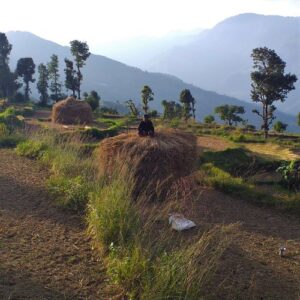

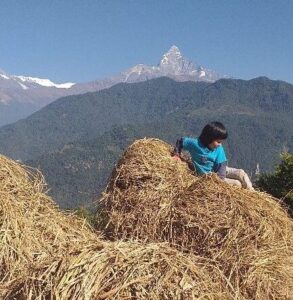
Marguerite Wong
3 Aug 2021Dear dear Ii Ling, you truly have the gift of writing. Can just picture what you wrote with the two boys, or big boys or teenagers now! What a wonder-full life to live, the envy of many many city dwellers! Keep writing Ii Ling and always look forward to reading your posts. Love to Ganesh, your parents and siblings
IiLing
1 Aug 2021Thanks Radhika. Little ones don’t hold grudges for long so he has moved on. 😃
Radhika Acharya
31 Jul 2021Lovely images to go with so much of eloquent writing! 🙂 Hope Little A has recovered from the sorrow of losing the tadpole mistaken for a fish.